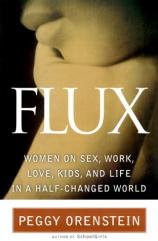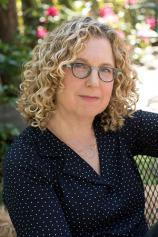Reading Group Guide
Discussion Questions
Flux: Women on Sex, Work, Love, Kids and Life in a Half-Changed World

1. In the introduction, Orenstein asks: Is there a point when women feel they "should" marry and "should" have children? In your experience and in that of the women in this book, is there?
2. Discuss the architecture of this book: The opening of each section presents a chorus of voices, leading into the solos that anchor chapters. How does this add to the author's examination of the subject?
3. Early in the book, one of the author's subjects wonders "if we'd be happier living in a society where there weren't so many choices." Do you think our mothers were happier? Our grandmothers?
4. Throughout the book, at every age, women seem to butt up against the question of working for meaning or working for money. Discuss the difference and the pros and cons of each choice.
5. Many of the women in their twenties that the author talked to thought of marriage as a means to an end, namely, children. Did you look at marriage this way? Do you now?
6. A group of female medical students discuss a seminar they'd just attended on work-family balance (page 38). None of their male classmates came, nor did the women expect them to. What are the implications of the men's absence on their future careers and personal lives? What can we expect or demand from men?
7. Discuss the corporate double-bind in relation to women: Women who are perceived as feminine are considered ultimately ineffectual, but those who are seen as too masculine are considered overly aggressive.
8. Many of the working women in this book, whether they view themselves as on the fast track or the mommy track, report that it is the women at work who judge them most harshly. Is this true in your experience? If so, why do you think this happens?
9. Discuss the moment of recognition that Shay Thomas, the medical student, has when she realized she might well have a satisfying relationship if she were a secretary instead of a future doctor. Part II: "The Crunch"
10. Talk about the "crunch years" as they relate to your life (or as you expect them to). Do you find that, as the author states," 'you can be anything' collides with 'you can't have it all' "(page 97).
11. Do you think more women would be likelier to look at single life as an option and not a sentence, if we celebrated its ease, rewards, and satisfactions?
12. Talk about the role of money in marriage. Is it the true source of power? Has your marriage ever undergone changes in the balance of power because of a dramatic change in the earning status of you or your spouse? Can you/could you imagine marrying a man who would make less money than you over the long run? What would be the advantages and disadvantages?
13. Talk about children as "an obstacle to fulfillment rather than its source" (page 105). In what ways do women tend to overidealize motherhood?
14. Orenstein notes that women, whatever their arrangements, feel like lesser mothers than those of the previous generation, while men, even with minimal participation at home, feel like better fathers (page 110). Do you think this is true? If so, why? What might change this?
15. The author reports on the furor in response to a powerful woman's commencement address comment that parenthood and power are mutually exclusive for women (page 127). Do you agree with the comment or with the furor against it?
16. The author quotes psychologist Mardy Ireland who divides women who don't have children into three groups: traditional, transitional, and transformative (page 129). Discuss these breakdowns and labels. Where are you on this spectrum?
17. The author examines a "single mother by choice" who became pregnant with donor sperm. Discuss the option of deciding to become a single parent. Is it something you can imagine doing?
18. Discuss the author's suggestion that "neither a woman's early childhood experience nor her expectations...nor even a feminist orientation can predict how she'll navigate the choices and constraints of motherhood" (page 167). Looking back at your life and the life of your sisters or close women friends how do you account for the different choices you've made?
19. Talk about the ways that our culture "conspires against egalitarian co-parenting" (page 174). What is your response to caretaking fathers when you see them at the mall or the playground? Have you ever treated a caretaking father as less competent than a similar mother?
20. Orenstein comments that women's endless attempts to be the Perfect Mother remind her of teenage girls, who, no matter what their weight, see themselves as fat (page 179). How good does a mother have to be to be "good enough?" What role does "mother management" play in how we see good motherhood?
21. Carrie discusses her expectations for her son and daughter (page 183). She would like her daughter to have a career before a family, and be able to choose whether to work or not. But she never imagines her son as a stay-at-home dad. How do you imagine your children's lives? Are we perpetuating inequality in our dreams for our kids?
22. Which women did you most and least identify with in this book? Which woman had experiences or made choices that were most enlightening to you? Part III: "Reconsiderations"
23. Women executives cite pay inequity, old-boy networks, dead-end jobs, and stereotyping as greater obstacles to their careers than motherhood. Is motherhood helping to obscure the depth of inequalities in the workplace?
24. Orenstein quotes anthropologist Mary Catherine Bateson who wrote, "A pattern chosen by default can become a path of preference" (page 217). Talk about examples of this in the book and in your own life.
25. The author saw a clear distinction in issues of self-image between working mothers and those who were home full-time. Talk about how this was illustrated by the women in the book.
26. Are there any choices you've made in regard to the issues of marriage, kids, and work that you'd consider changing after reading this book?
27. The author reports that a recent study of sexual dysfunction, found that "lack of interest in sex was their [women's] number one complaint" (page 230). Is this true to your experience? Was it true to the experience of the women in the book?
28. Currently, one out of every two marriages fails. Clearly, as an institution, marriage is not built on bedrock. So why do so many women see marriage as a goal? Do you, or did you?
29. In what ways were the African-American women's experiences different from the white women's in the book? Where was the common ground?
30. Orenstein states emphatically, "If you're doing it all, you do not have it all" (page 287). Talk about the truth of this in your life. Now that you've seen it all, do you even want it all?
31. The author states that if things are ever going to change, men need to recognize and deal with the work-life dilemma. What can women do, personally and on a societal level, to ask men to address this question, to ask them to struggle to maintain balance just as women do?
Flux: Women on Sex, Work, Love, Kids and Life in a Half-Changed World
- Publication Date: February 13, 2013
- Hardcover: 336 pages
- Publisher: Doubleday
- ISBN-10: 0385498861
- ISBN-13: 9780385498869








